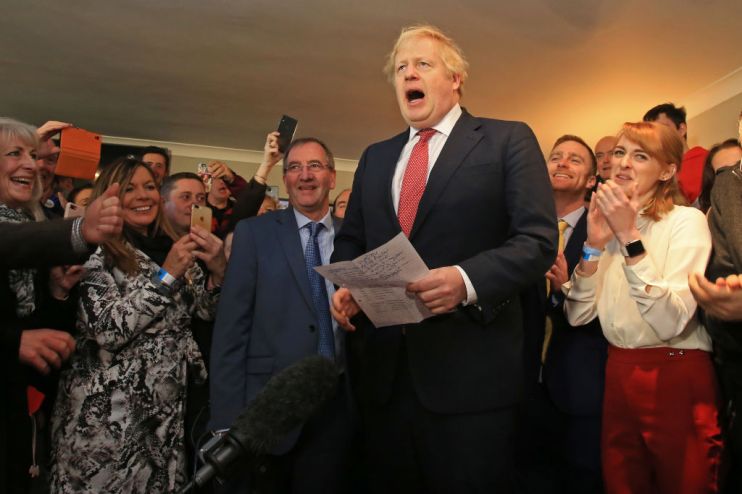How Boris Johnson became the heir to Blair

Politics is the art of winning and keeping power.
New Labour understood this. They were the greatest election-winning machine of modern times.
But to the Corbynistas (Old Bennite Labour revived), New Labour are the enemy of true socialism. Jeremy Corbyn’s Labour want nothing to do with New Labour’s people, policies, or campaigning techniques.
Unfortunately for the Corbynistas, Boris Johnson’s Conservatives have no such aversion. They studied New Labour’s style and appeal very closely. What they learned was key to their election victory and to the fall of the red wall. Just as Tony Blair once did, the Tories have used the ideas of New Labour to crush Old Labour.
First come the focus groups. Like New Labour, Dominic Cummings starts with voters in small groups. He asks them what their priorities are. Then, from a Tory angle, he focuses on those priorities — and nothing else.
Just like New Labour in all of its elections, the Conservatives converted their focus group responses into a short list of “pledges”.
Most people find policy boring. So don’t drown them in it. Show them just a few things you know move them deeply.
Johnson’s pledges and those of New Labour in 1997 are remarkably similar. Both made simple, memorable promises about Britain’s secular god: the NHS. New Labour promised to treat an extra 100,000 patients. Johnson went bigger and more vivid: 50,000 more nurses and 50m more GP appointments.
The point about these numbers, of course, isn’t their accuracy. They are meant to be memorable ear-worms, lodging in your head and nagging away at your beliefs. That’s why they’re big and round.
Johnson’s pledges also went large on “millions” of pounds for schools. Again, the echoes of New Labour resound. Their focus-group-driven priority was, of course, “Education, Education, Education” — and they promised big investments to cut class sizes.
Everyone’s been to school and everyone gets ill. Education and health are eternal priorities for voters. New Labour and the 2019 Tories recognised this, and responded simply and directly — unlike Corbynite Labour’s million-policy manifesto which buried voters in detail.
The pledges of New Labour and Johnson are also uncannily similar on tax and crime. They both promised much tougher sentencing, and no rise in income tax for five years.
Message discipline was at the heart of New Labour. Ministers famously got daily texts from Peter Mandelson’s team telling them that day’s line.
The Conservatives have taken message discipline to new heights, repeating “Get Brexit Done” like broken Sat-Navs. Teeth-grindingly annoying it might be, but it worked triumphantly. Rather than risk going off message, Johnson hid in a fridge. As Mandelson long ago recognised, it’s better to look mad than to mar the message.
Words matter in politics. And this Conservative campaign stole New Labour’s lines. Johnson and Cummings talk constantly about “the people’s priorities”, just as Alastair Campbell once did. They also echo Blair’s ideas about the need for a dynamic free market economy to pay for the public sector.
But there is more. The Conservatives have celebrated their victory by using New Labour imagery like the spoils of war (for many of them, 2019 is long-awaited revenge for 1997). They have been tweeting, dancing and singing along to the D:reams track “Things can only get better” — the pop anthem of New Labour.
Like a victorious Roman general, Johnson made his celebratory speech in New Labour’s captured citadel (Blair’s Sedgefield constituency, which fell to the Tories). In that speech, he deliberately echoed Blair’s words, calling his government “the servants of the people”.
The Tory message is clear: we are the heirs to Blair. We are New Labour now.
This insight will shape the way Johnson governs. Because the Conservatives have realised that you can combine New Labour’s focus on voter priorities with a radical, right-wing agenda.
You can, for example, deregulate the tech sector, have a bonfire of procurement rules and planning law, “privatise” the BBC, and make overseas aid serve the objectives of realpolitik, provided you deliver enough on the electorate’s domestic priorities: health, crime and low taxes.
If you get these right, then most people (within reason) don’t care what else you do.
These are the lessons that New Labour taught from the centre-left, and which Johnson will now apply from the right.
As for the Corbynites, they should study New Labour. Even those we hate have something to teach us. They might learn about the politics of power, rather than pursuing the pointless politics of protest.
Main image credit: Getty